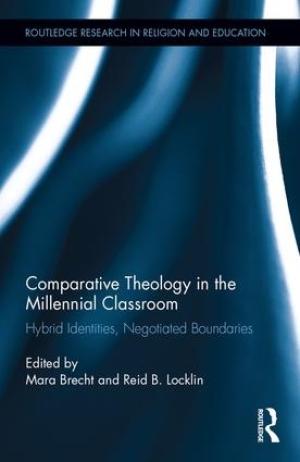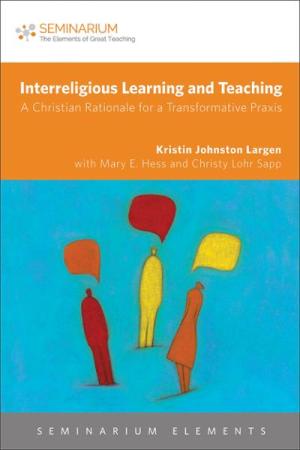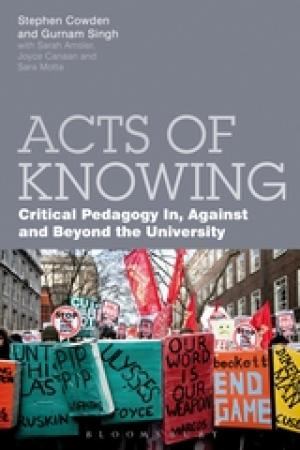Resources by Alison Downie

his is the fourth in the Routledge Research in Religion and Education series. The series editor provides a Foreword distinguishing between religious education as formation within religious institutions and the concern of the series, which is education about religion. In this context, the essays address comparative theology as a process and as a pedagogical method in primarily, though not exclusively, undergraduate classrooms. Editors Brecht and Locklin provide a concise, effective introduction which establishes an overview of the intersecting thematic components of the collection: comparative theology, particularly the “departure-and-return” model as developed by Francis X. Clooney, SJ., and ways in which the digital culture of the millennial generation impacts epistemology and identity. The fifteen essays are arranged in three sections. The well-placed first essay, by Judith Gruber, offers a postcolonial critique of the comparative theological model as implicitly essentialist. Essays in the second group address issues of identity raised by millennials and the nature of the millennial classroom in relation to comparative theology. Essays in the third section discuss hands-on examples and specific pedagogical practices. An afterword by Clooney, in which he identifies “six recurring issues” which he finds in the essays and addresses sequentially, concludes the volume. Clooney’s frankly personal account of his own context in developing the departure-and-return model and his rejoinder to the charge of essentialism bring the dialogue to a fitting end. The diversity of the collection is rich in both content and authorial voices, some of whom are well-established scholars and others of whom are emerging, most teaching in religious studies or theology departments at public or private North American universities, though the balance leans toward Roman Catholic institutional affiliations. Editors Brecht and Locklin note that this collection is the fruit of a Wabash Center teaching workshop. The robust range of reflection invites readers into the feel of a working group of teacher/scholars who share a concern for facilitating transformative learning in the religion or theology classroom, yet who address this concern and comparative theology’s relevance to the millennial context in quite distinct ways. A brief sampling demonstrates the range of perspectives authors develop: soteriological privilege (Brecht); Muslim theology of tawhid (Hussain); embodiment and material culture (Gasson-Gardner and Smith); storytelling as a pedagogical method of African Traditional Religions (Aihiokhai); comparing dharma and moksha, works and faith, ethics and spirituality (Yadlapati); a voluntary female Jewish-Muslim textual study group (Golberg); and use of film in an online context (Sydnor). As Jeanine Hill Fletcher writes in her essay, “the work of the comparative theology classroom shares in this important work of shaping citizens in a multifaith world toward tolerance, appreciation, meaningful relationships, and the common good” (149). The same may also be said for religious studies classrooms. Many teachers of religion who are neither theologians nor comparativists by academic training will nevertheless find this collection useful and even inspiring for their pedagogical reflection and practice.

Published in the Fortress Press series, “Seminarium: The Elements of Great Teaching,” this affordable, concise volume is targeted for Protestant seminary professors in particular but will also be of value to those working in Christian higher education and ministry, more generally. The teacher-friendly format features three chapters of text by K. Johnston Largen, punctuated by sequentially numbered, stand-alone text boxes of “Praxis Points” by C. Lohr Sapp, and responses to each chapter and an epilogue by M. E. Hess. The text offers many useful resource references including texts, websites, and video clips. Quick Response codes intersperse the text and the relevant URLs are also provided in footnotes. The first chapter presents four specific examples of interreligious experience relating to Hinduism, Islam, Buddhism, and Judaism, in order to demonstrate the urgent and practical importance of interreligious education and dialogue. The second chapter offers a theological rationale for such learning drawing upon insights of comparative theology. The third chapter suggests expected outcomes and pitfalls, strategies for including interreligious learning within a theological curriculum, and considerations for assessing transformative praxis for students, faculty, and institutions. The format highlights the richness of collaborative work that coheres well throughout the volume yet offers distinct contributions by each authorial voice, modeling the value of dialogue in its overall presentation. Theological references are primarily Lutheran and Roman Catholic but also model dialogue within Christian diversity. A further dialogue which informs all aspects of this text involves pedagogical scholarship, particularly literature associated with adult learners. Each author demonstrates pedagogical depth and writes in a personal, accessible, and occasionally humorous tone. Since the authors emphasize the importance of meeting students where they are and structuring learning opportunities with this in mind, a great deal of attention is paid to resistance and fears some Christian students continue to have toward learning about other religious ways and practices. Readers who are not actively involved in communities or educational settings that reflect this tension and ambivalence may be impatient with the introductory nature of the volume. The authors write to convince and inform those who are beginning or seeking to encourage others to begin this type of transformative praxis.

Readers who believe there ought to be profound differences between universities and businesses will rejoice in reading these probing and rousing responses to the commodification of education, theorized here as one result of “the global dominance of neoliberalism”(5). The voices in this collection, primarily scholars in the United Kingdom, turn to critical pedagogy, broadly defined, as the best resource for unmasking and dethroning the dehumanization of this ethos. While Paolo Freire’s thought undergirds the collection, these scholars draw on a wide array of critical theorists to address many intertwined issues regarding the inherently political nature of education and its transformative and justice building potential. After a short introduction which traces the broad outlines of its critical approach, the collection divides into two parts. Part One, “Perspectives on the Crisis in Education,” includes four essays by U.K. scholars and Part Two, “Dialogues on Critical Pedagogy and Popular Education,” consists of edited transcripts of six interviews, originally podcasts funded by the U.K. Higher Education Academy Subject Centre for Sociology, Anthropology, and Politics. Each interview, conducted by one of the editors of the volume, is with an educator who has been shaped by and employs critical pedagogy. The outstanding first two essays, co-authored by the editors, explore issues of student debt and consumerist pedagogies. Each of these essays offer careful, convincing, and devastating analysis of ways by which what is “sold” as beneficial to students (for example, student loans, use of student evaluations) often works against their best interests. The third essay draws cogent connections between critical pedagogy and radical democracy, concluding with an emphasis that, while critique is necessary, it is limited by remaining within the frame of the oppressive structures it opposes. Insights of critique must be used to build new structures, new ways of relating and forging solidarities for change. In the fourth essay, the author reflects on student response to her critical pedagogy in a Master’s level class. In Part Two, the six interviews are conducted with professors of social work, sociology, community education, information management, education, and aboriginal studies. As editor Singh explains, the decision to include interviews is intended to present critical dialogue as process. In addition, after each interview there are helpful lists of references and suggested readings. In one interview, Freire’s Catholic heritage is acknowledged and the interviewer refers to his own unspecified “tradition” (presumably Sikh), but without the development which would have been fascinating to read. Religious studies teachers may be disappointed that, aside from this glancing reference and aspects of the interview on indigenous knowing, there are no attempts to integrate religious or spiritual concerns with the ethical contours of critical pedagogy. Unfortunately, numerous typographical errors also are evident throughout the book, including occasional omission of an important word (such as “not”). But for those committed to higher education as a social good, this collection will be provocative and inspiring.